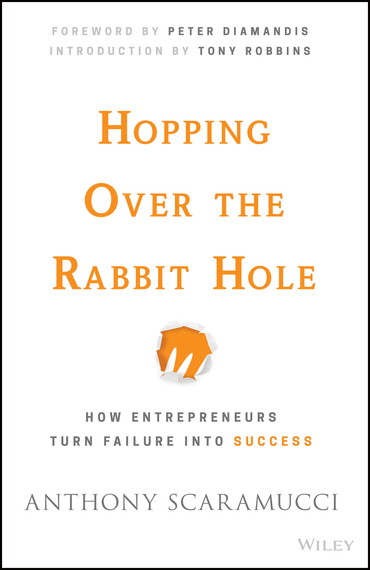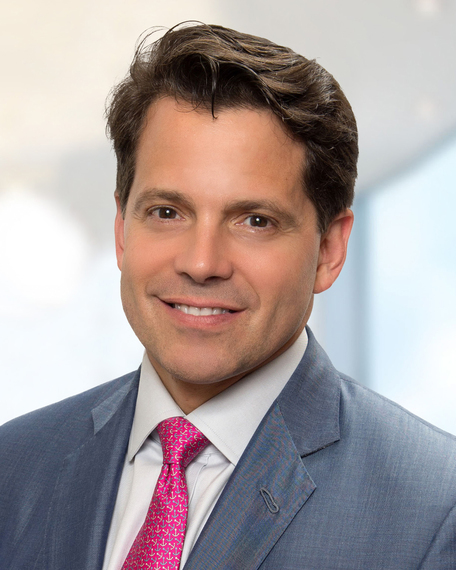When legendary record executive Walter Yetnikoff was asked to explain his job, he replied, "I mingle, schmingle and bingle." Yetnikoff went on to write Howling at the Moon, a very entertaining book about the music industry that was heralded for its candidness.
In a culture dominated by political correctness, finding the Loch Ness Monster may be easier than encountering honesty and bluntness from public figures, especially in the world of financial services. Fortunately, Anthony Scaramucci has written Hopping Over The Rabbit Hole: How Entrepreneurs Turn Failure Into Success and it's not a story of a meteoric rise, but rather a steady ascension (with some bumps along the way) to a remarkably distinctive career. Scaramucci is the founder of SkyBridge Capital, a global investment fund, producer of the SALT Conference, as well the host of television's Wall Street Week and he has written a book for everyone -- not just entrepreneurs.
Like many other books of this kind, Scaramucci employs clever chapter titles and quippy paragraph headings, but what distinguishes this from standard "How I Did It" books are the abundant anecdotes that reveal Scaramucci's experiences (some of them failures) as valuable life lessons.
"My career has been littered with failures, and my firm's success was ultimately defined by our ability to learn from mistakes and turn failures into success."
Although he never emphasizes his self-deprecating sense of humor, I believe this is Scaramucci's most endearing characteristic and a major reason for his ongoing success. Rabbit Hole opens with a story about the launch of the first SkyBridge Alternatives Conference (SALT) in Las Vegas, when Steve Wynn introduced Scaramucci as "Andrew" in his opening remarks. Scaramucci has a unique ability to take what are terribly embarrassing situations for the rest of us and put a positive spin on them.
In a chapter titled Partnering Up, Scaramucci details a fight he had with one of his business partners regarding The Hunt & Fish Club, a restaurant they were launching. Scaramucci had sent his partner an angry "passive-aggressive" email that resulted in a unique response. His associate sent him a perfectly written email littered with f-bombs that wowed Scaramucci unexpectedly.
"The email must have taken hours to craft. It was almost like an ancient text. Each time I read it, there seemed to be some new, deeper, unexpected meaning. It was like a profanity haiku."
Scaramucci spends a few pages discussing the "f-bomb masterpiece," which he believes belongs in a museum and although he didn't print the actual email, his recounting made me laugh out loud. Despite being insulted 36 times in a single missive, Scaramucci found not only great humor in the situation, but also realized that he was responsible for the problem in the first place. He went on to reconcile with his partner and launch a popular restaurant.
Scaramucci is equally forthcoming in Chapter 9: Negotiating Need Not Be War. Negotiating is a topic that's been beaten to death by countless authors and speakers but Scaramucci immediately demystifies the process and helped make me aware of my own shortcomings as a negotiator.
"Movies have romanticized the business of negotiation. I'll let you in on a little secret: Most negotiations don't happen at a 60-foot table on the 50th floor in a smoke filled room. They're less dramatic. They also happen fast, so if you don't have a plan in place you're going to end up on the short end of the stick."
Scaramucci also discusses how serendipity and luck are factors and his anecdote about buying Citigroup's hedge fund business is a far more interesting story than has been told in any movie about the business world.
"Simplicity has always been the lifeblood of entrepreneurs. If you're looking for the next great idea, perhaps you are looking too hard."
Rabbit Hole continually explains how to achieve success by overcoming one's failures -- and Scaramucci is not shy about revealing his own. His first Wall Street job was as an investment banker at Goldman Sachs, but that chapter of his career was short lived when he was abruptly fired. In an unconventional move, Scaramucci convinced Goldman Sachs to hire him in their securities sales division and it was there he found his niche. Many others would have moved to a lesser firm or another industry entirely.
Scaramucci is proud of his modest blue collar background and while he doesn't bang a drum with it, he's definitely (as my mother used to say) a real mensch. While launching SkyBridge, he spent a good deal of time at the Harvard Club, where he made a point of being friendly to the entire staff. This clearly made an impression, because he was eventually approached by an employee who had received $35 million dollars in a medical settlement and wanted Scaramucci to invest it for him. Scaramucci didn't take the account but instead referred him to a money manager more suited to the circumstances.
"I was honored that he thought highly enough of me to ask my advice on something so personal and important. Without knowing a single thing about my business or how I made money, he felt he could trust me."
Rabbit Hole is not an autobiography. While it can be somewhat tangential at times it is without a doubt a useful toolkit offering many options and alternatives for those seeking a handbook for success. I spoke with Scaramucci on the phone and asked him why he wrote another book, given all of his other successful endeavors.
"I believe that our best and happiest moments come when we're helping others. I love enriching people's lives whether it's by helping them protect their financial well-being or just giving them good advice on life and business."
I've interviewed Anthony Scaramucci many times, and I've always walked away feeling more upbeat and positive after speaking with him. This book had the same effect on me.


